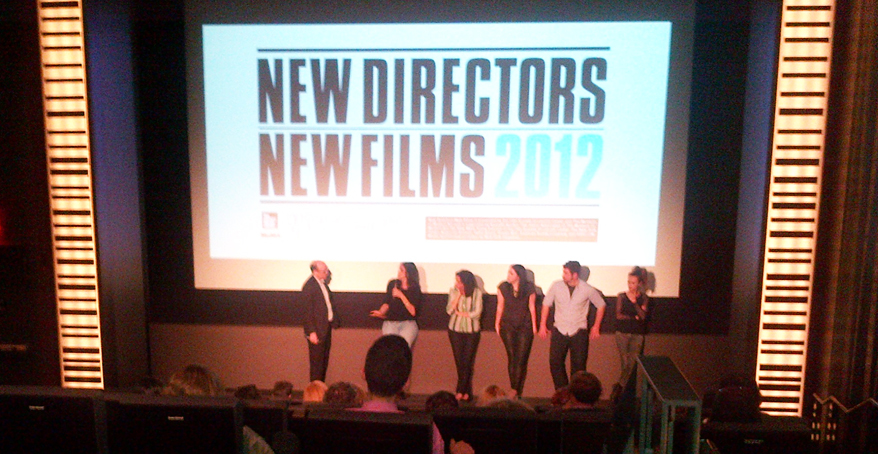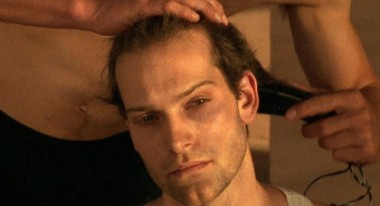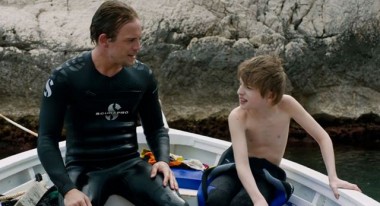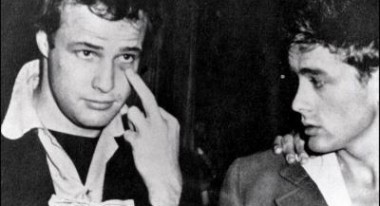 Back to selection
Back to selection
Words and All: New Directors/New Films (II)
 Photo: Matt Lenski
Photo: Matt Lenski Hej hej JJ
If doomsday scenarios compromised by persistent protagonists were the common denominator among the finest in week one of the back-loaded New Directors/New Films, the second week’s standouts hail successful rebounds. Entropy, smugness, resignation, and delusional security make way for palpable commitment, be it political, psychological, or emotional.
The shared backdrop is the guarded, mine-ridden sphere of male bonding, more often than not inside restrictive institutions — a pair of bromances that take place within military bases and their outposts; a boy-gang dystopic chiller that revises the conventional sleepaway-school movie — but also within the split psyche of a troubled man and his double. The most overt likeness, however, is formal: language as a structuring device, as essential as it is in live theater. Dialogue does not necessarily adhere to a written script. It is not an add-on to a set of storyboards. It is a fundamental building block. In the beginning was The Word.
The five superior titles are listed below in order of preference — four from Europe and one from South America, but, once again, none from North America. These have at best minute US distribution in place. That’s the downside of successfully executing an original vision. These are hybrids, difficult to pigeonhole. Genre, for all its impressive manifestations, is a polite euphemism for assembly-line reproduction of prior sellers. Unfortunately, the trades, mainstream media, and ultimately the public aid in maintaining the status quo. Since 1972, ND/NF has encouraged our employment in the process before fickle free-market economics eliminates the most novel products. Take the job.
Fort Buchanan (Benjamin Crotty, France/Tunisia)
Wordsmithery: Expat American director Crotty puts into his characters’ mouths US TV dialog, much of it collected from programs first broadcast in the ‘70s.

A moving eulogy for a French soldier who, following deployment, chooses suicide over resubmitting to redundant domesticity provides an apt elegy for the soon-to-close titular base and its tight-knit community of waiting wives and gay husbands preparing to disperse. The priest tells the intimate gathering that the deceased does not leave behind large bequests or a record of great deeds, “but a few carols vibrating through the air, for comrades and lovers … Love is the best thing going on. And there seems to be a lot going on here.” A fitting coda over the final credits is Swedish duo The Tough Alliance’s poignant song “1981,” in which the lyrics segue from one person’s defeatism to encouragement of those left behind to move forward.
At the center of the film is handsome, slightly fey Roger (Andy Gillet), a naif who takes his marital vows seriously. His husband of 18 years, Frank (David Baiot), is stationed in the arid African no-man’s-land known as Djibouti. Living with Roger is the couple’s blossoming daughter Roxy (Iliana Zabeth), who unconsciously entices shamelessly horny women when she’s not punching out her cowed dad. In a transition noted only by a small animated helicopter from a video game, we follow Roger and his gaggle of pals when they show up unannounced, and much to his chagrin, at Frank’s fort. As at home, where this crowd is almost incestuously insular, they function as a single unit. “Do we like Assange?” asks hot trainer/farmer Guillaume (Guillaume Palin) — who will prove indispensable to the male-bonding theme — before forming an opinion based on a newspaper article. Some do go and get off sexually, but such libertine behavior is a given anywhere with these bored, frustrated wives. In another unexpected jump, we are back at Fort Buchanan, observing everyone packing up. For some, the shutdown turns into an opening.
Former painter Crotty shot mostly in his adopted France for 15 days at a time during four distinct seasons, two years running. The surrounding trees and streams are beautiful, but the film’s architecture, correlated to mindsets, provides the strongest — and strangest — imagery. The stay-at-homers live in small, modular, wood-and-metal eco-cabins built in the forests of Alsace-Lorraine by French designer Matali Crasset. No electricity: Self-sufficiency, a very American ideal, is the underlying concept. In Djibouti, the gossipy friends stay and play in Fort Griffiss — in reality Crasset’s Dar Hi Hotel, an eco-lodge and radically different structure, with thick exteriors the color of the endless surrounding sand and large walls of glass that open out the spacious interiors from a safe distance. Pragmatism, another American virtue, is at the root of both form and function. Crasset calls her work scripts for living.
The Great Man (Sarah Leonor, France)
Wordsmithery: A Chechen’s young son has waited for five years in Paris for his father, who enlisted in the Foreign Legion to obtain French citizenship. Once they are reunited, the boy is unresponsive, rejecting his background and at first speaking only French.

French soldier Hamilton (Dardenne regular Jeremie Renier), a high-energy manic who will later suffer from PTSD, and the very controlled Chechen refugee Markov, aka Mourad Massaeu (first-timer Surho Sugaipov), forge a tight connection during their tour of duty in Afghanistan. They become inseparable patrol partners. During a forbidden foray following the confirmed sighting of a leopard, Markov courageously saves Hamilton’s life. The latter is sent home, but Markov faces dishonorable discharge unless he reenlists for three years. Spitting in the eye of the French government, he arrives in Paris an illegal immigrant, an official OLFT: Obligation to Leave French Territory.
A slow, painful process of getting-to-know you begins between father and son Khadji (Ramzan Idiev). It pays off once Markov starts treating the impressionable kid like a legionnaire, demanding its “protocols” be met. He finds Hamilton in a hospital where he is undergoing intensive physical therapy. (“I want action, sir!” he tells his immediate commander.) Hamilton behaves like a high schooler. The insensitive bedroom manner with which he treats a woman he has met in a bar cues us to his inability to face genuine responsibility.
The challenge presents itself. Hamilton is confronted with a dilemma: Do the right thing by his close friend, or blow him off altogether. Khadji keeps running away from a facility outside the city after he is determined a UFM: Unaccompanied French Minor.
Leonor compounds the narrative. A voiceover at the start of the film turns out to be Khadji, who resumes it late in the game. Leonor applies effective visual flourishes, like spots of light that create different moods and consistent symmetrical placement of the main characters. Cautious tracking shots add a touch of grace. Laurent Desmet’s cinematography is both precise and nuanced throughout.
The Tribe (Myroslav Slaboshpytskiy, Ukraine)
Wordsmithery: The entire cast of nonprofessionals is deaf, so fingers, hands, and flailing arms substitute Ukrainian sign for articulation.

Slaboshpytskiy depicts the dark, stark reality behind the rundown, peeling façade of a boarding school for the deaf in Kiev. Compared to the more hopeful films situated in martial institutions, this deals only with the negatives. The sole organization is quasi-paramilitary, its hierarchy hardly a meritocracy. The only requirement for membership is victory in a no-holds-barred fight during a hazing ritual. Amoral tough guys climb the ladder to attain such coveted positions as pimp/protector of two young women transported nightly in the back of a van to a packed truck stop to earn cash inside brightly colored cabs.
The teenage boys do not bond with one another constructively. Their commitment to “the tribe,” as the group is known, has ugly consequences. They ally themselves not as friends but as faux soldiers in combat with weaker students and anonymous citizens for cash and valuables. They deal drugs and are clearly complicit in prostitution, preparing to advance to international trafficking. Besides enriching a working staff of collaborators, what is the point? Money for money’s sake? It might be a cliché, but this dreary community is a microcosm for the society from which these youths have been removed.
With the invaluable assistance of DP Valentyn Vasyanovych, the director invites us into the story with long Steadicam shots close to each subject, along depressing pale blue corridors and narrow passages between rigs that can barely accommodate a human hurriedly walking through. Slaboshpytskiy wants it both ways: he also keeps us outside, often literally, by shooting symmetrical compositions through glass. Normal distancing is exacerbated by the disorienting lack of dialogue for us to hear, no matter where we are positioned. Fantastic contradictions abound. The facility is like a prison. When they are not shooting through glass, they’re filming someone peering out of it, through anachronistic windows with splendid radiating spokes that are pretty much all that is left of the place’s former Old World splendor. Hell, the original Turkish toilets are still in place.
Two scenes are emblematic of the filmmaker’s approach. When The Tribe opens, angelic provincial teen Sergey (Grigory Fesenko), suitcase in hand, arrives at the back entrance of the empty main hall, its exterior walls almost totally glass. The camera remains fixed in the center, shooting through two glass walls toward the front of the structure, where a headmistress leads the students, cloaked in their tidy school uniforms, in some kind of rite, their hands shaking vigorously while their arms stretch high up in the air. This is a hallelujah for the deaf, an example of the demonstrative expressions we will also encounter in huge arguments and nasty threats. By the time the woman enters the building and receives the pupils one by one, Sergey has circled around and comes in with them. This is the end of innocence for the kid, who soon discovers that this is a world in which one is either perp or victim.
The other scene begins with the sound of a doorbell: a normal one for most viewers under the usual circumstances, but in this constant quiet, explosive. It’s an appropriate omen for what comes next: a harrowing back-alley abortion undergone by one of the prostitutes, Anya (Yana Novikova) — now the obstacle between Sergey and the gang whose code of behavior he defies. In silence, a deaf middle-aged woman performs the procedure with a flimsy piece of rope hanging on the clothesline substituting for professional stirrups. Bringing the scene full circle are Anya’s audible breathy screams once the excision is complete. The horror can only be matched by some nearly unwatchable, and here unspecified, events further along in the film. Slaboshpytskiy backs away from nothing, including sex so graphic that the degree of simulation is unclear. But what would I know?
Listen to Me Marlon (Stevan Riley, UK)
Wordsmithery: Conversations with himself under self-hypnosis are included in the 200 hours of audiotape Brando secretly recorded that are the starting point of this doc.

Brando narrowed down Jaques’ famous declaration in Shakespeare’s As You Like It — “All the world’s a stage” — to a more manageable metaphor. In British documentarian Riley’s outstanding collage — commissioned by the actor’s estate to mark the 10th anniversary of his death — the actor compares the head itself to “a theater stage.” He calls the top the proscenium and works his way down. The analogy is rather concrete for a man who waffled all his life about his chosen profession, from complete immersion during his years studying Method with mentor Stella Adler, to a pejorative view of acting’s silliness and lack of value, and finally to a late-in-life acceptance of its pluses (“We all act in life”), particularly as a useful divertissement for the public.
It’s fitting that Riley begins this non-linear film, in which the visuals frequently run counterpoint to the soundtrack, with a 3D, ghostly white, digitalized image of Brando’s own head that he made in the ‘80s with the help of Cyberware software. It actually speaks, the comments taken directly from the tapes. (The filmmaker also used TV and recorded interviews for print — in fact, almost anything he could find with the actor’s voice.) The doc is chock full of clips from his movies and photographs taken throughout his life, but foregrounding the artificial head supports the unifying theme of the film. Brando was a man of infinite contradictions, and these personal tapes are confessional and consciously divided by two opposing personalities commiserating (“Listen to me Marlon”) with the goal of making sense of his life and the world around him. Ergo, no actual photograph or TV interview captures the essence of the man. The best we can do is to use a computerized simulacrum of the most visible and significant part of how we present ourselves to the world.
Of course, Brando’s whole life becomes a stage. Partly from choice of roles, his films and private life meld into a single spectacle. When they don’t, he forces them to merge, such as having Mexican-American poseuse “Sacheen Littlefeather,” who resembles Natalie Wood near the end of The Searchers, reject his Oscar for The Godfather on account of the government’s treatment of Native Americans. This is not to claim that his mid-career activism — first for civil rights in the ‘60s, then for Dennis Banks and the American Indian movement a decade later — was anything but sincere. His involvement in politics paralleled his dedication to his craft: either fully committed or 100% disengaged.
Besides intelligence and a natural curiosity, the tapes reveal occasional fear, constant self-deprecation and, no matter how universally recognized his talent, a sense of unworthiness possibly rooted in his absent, drunken father’s rejection. Holing up on his personal Tahitian island or inside his huge Mulholland Drive mansion could not bring peace of mind, especially after the suicide of daughter Cheyenne and imprisonment and early death of son Christian. “Mine was a glamourous life, but completely unfulfilling,” he reflects. Riley has mined a great opportunity, one which leaves us feeling sad and empty. Brando and the cinema were a great fit: Everything is an illusion.
Los Hongos (Oscar Ruiz Navia, Colombia/Argentina/France/Germany)
Wordsmithery: Having evolved from slackerdom to political consciousness, two stoned, relatively non-verbal bicycling teens from opposite sides of the tracks in Cali join a movement that enables visual self-expression. At great risk, they spray in public spaces art inspired by progressive slogans and TV news reports on troubling military actions.

Ras (Jovan Alexis Marquinez Angulo) is the black son of a poor single evangelical mother from the provinces who resides in an apartment in a slum. Calvin (Calvin Buenaventura Tascon) is the white son of divorced parents, fully devoted to his beloved, unintentionally funny grandmother, with whom he lives in her lovely home in an upscale neighborhood. The boys’ tight friendship is divorced from class: Their addiction to graffiti art connects them in a more profound place. Videos of the Arab Spring riots awaken them. They attend a meeting of the city’s top graffiti activists, where they propose creating a tribute to the protesters that would be part of a larger group project. This is no vanity production to show off their skills, but a collaboration as the means to progressive social ends.
The film is lyrical, not especially linear. Ruiz calls it a documentary dream, a poetic rendering of realistic raw materials, aiming for a “daydream” rather than naturalistic effect. We get a nice tour of assorted sections of the city — rich, middle-class, and impoverished — while we accompany Calvin on his bike. There are other digressions, some more successful than others. Ras’s mother sings a wonderful nostalgic ballad about the region from which she has been displaced, though her evangelical zealousness becomes tiring. Calvin’s dad is an ex-actor quite comfortable with being on, and though his musings over cards about Colombia’s problems with corruption and drugs are informed and interesting, they call the action to a halt. His son and his buddy end up running afoul of the powers-that-be. There is, naturally, a price to be paid.
